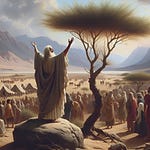What do you do when yesterday’s blessing can’t meet today’s need? In Exodus 16, God once again teaches His people the importance of trusting Him for daily needs.
vv. 1–3 - we’re told that the children of Israel “took their journey from Elim, and…came unto the wilderness of Sin.” The name “Sin” here is unrelated to moral transgression, but it’s a fitting backdrop. The people had just left Elim, a place of refreshment. Now they enter scarcity. And in the absence of satisfaction, the old carnal reactions return. Verse 2: “The whole congregation… murmured.” The murmuring isn’t isolated. It is a plague of the heart that infects the whole camp. They say, “Would to God we had died by the hand of the Lord in the land of Egypt… when we sat by the flesh pots.” Their memory is warped. Egypt becomes idealized. Oppression is reimagined as comfort. And notice the theological inversion—they attribute death to God and life to their slavery under Pharaoh.
vv. 4–8 - introduces the first explicit mention of “bread from heaven.” The Lord declares He will rain it down—a verb used for judgment in Genesis 19 and blessing here. Daily gathering will test them, “whether they will walk in my law, or no.” The provision functions as a probation. Then Moses and Aaron confront the people’s misplaced anger. “Your murmurings are not against us, but against the Lord.” Murmuring is a subtle sin—it feels like frustration with circumstances or people, but it is rebellion against providence. Moses makes this plain.
vv. 9–31 - We’re told in v. 10 that God’s glory appearedWe learn that God sends quails, covering the camp (v. 13). This was not entirely foreign; migratory birds like quail would tire over the Sinai and descend low. But God controls the timing and this event is miraculous. Then in the morning—dew falls, and when it lifts the Israelites discover “a small round thing… as small as the hoar frost.” It’s described in verse 31 “like coriander seed, white; and the taste of it was like wafers made with honey.” Jewish tradition suggests it tasted according to the faith of the eater. The more they trusted God, the sweeter it was. Psalm 78 calls it “angels’ food.” Psalm 105 says they were “filled with the bread of heaven.” But they called it “Manna” which basically means, “What is it?” In verse 19, they are told not to hoard the manna. Every day, except the sabbath, they are to gather only what is needed, as God teaches His people the importance of daily dependance on Him. When some try to stockpile the manna, the leftover breeds worms and stinks. On the sixth day, a double portion is gathered to provide for the sabbath as well. After years of slavery, the creation ordinance of the Sabbath is reintroduced into the community.
vv. 32–36 - Moses commands a pot of manna to be preserved “throughout your generations.” As Hebrews 9:4 later notes, it will be placed in the ark of the covenant alongside the law and Aaron’s rod. God’s provision, God’s protection, and God’s prophetic Word all kept together. A testimony of the One who feeds, defends, and counsels His people.
Application
God uses physical hunger to expose spiritual forgetfulness. When physical discomfort arises we often learn how shallow our spirituality is. The taste of past deliverance is forgotten under the shadow of a present difficulty. We might even be tempted to believe we were better off in bondage. But God uses hunger to humble us (Deut. 8:3) and to teach us spiritual lessons. Your spiritual needs are far more pressing than your physical needs, and yet you respond much more violently to the physical needs. If you’re lacking material provision, ask yourself, am I as desperate for spiritual nourishment as I am for my material needs? That question can be very revealing.
Sin is a social contagion that must be rebuked. Every murmur is a muted accusation against God’s goodness. The people blame Moses, but Moses puts his finger on it: “The Lord heareth your murmurings.” I can tell you that it is extraordinarily difficult as a leader under assault to address the sin of murmuring. It is easily interpreted as avoiding responsibility. And yet murmuring is a common sin. It is prayer in reverse, and instead of using our tongue to bless we use it to curse. Discontentment is the beginning of rebellion. Kill it early.
Christ is the true Manna who satisfies daily and eternally. In John 6, our Lord says, “Moses gave you not that bread from heaven; but my Father giveth you the true bread from heaven.” Then Jesus declares, “I am the bread of life.” Like the manna came from heaven to earth, so did Christ. As manna was to be gathered daily, so Christ is to be enjoyed daily. However, the manna was temporal, perishable, replaceable. But Christ is permanent, imperishable, one-of-a-kind. Christ isn’t just for your salvation, He is your daily provision. It is astonishing to me how few Bible-believing pastors preach Christ to their people. It’s all Bible principles. But God didn’t send sinners principles, He sent sinners a person. Do you feast on Christ? Is He your portion? Or have you returned to the flesh pots of Egypt? It’s interesting how v. 4 marries the gathering of manna as a test of obedience. Your appetite for Christ is a reflection of your love for God. Make sure you are going out daily and stooping down into God’s Word to find Christ in order that you might feed on Him by faith.
The Sabbath is a reminder that provision and preservation belong to God. On the sixth day, the manna doubles. On the seventh, it ceases. What’s the lesson? That rest is not laziness—it’s an expression of faith. To keep one day in seven for worship is not idleness. It shows you are anchored in the knowledge that a) your first priority in life is worship, b) that God has freed you from slavery in order to live for Him, and c) that God will provide for your needs. The initial purpose of the Sabbath was on creation, but eventually redemption is also paired with it, culminating in new covenant believers worshipping on the first day of the week to place an emphasis on the new creation. In either case, we cease from our labors to celebrate Christ’s labors. We rest in order to rejoice. The principle of one day in seven is not just obedience, it is a regulatory practice that strengthens the believer’s faith as they are encouraged to consider Christ who is the rest for the people of God. Do you observe it? Too many professing believers practice what amounts to two Saturdays. Don’t. Give the first day of the week to God.
“Take care that you go diligently to work to get this spiritual food. The Israelites were up early to gather the manna which fell morning by morning. Be not idlers with the Word of God—search it. Got up early in the morning to read your Bible if you cannot do it at other times. Steal from your sleep a happy hour to read the Scriptures. Diligently and earnestly seek the Lord, for He has said, “They that seek me early shall find me.” — Charles Spurgeon










